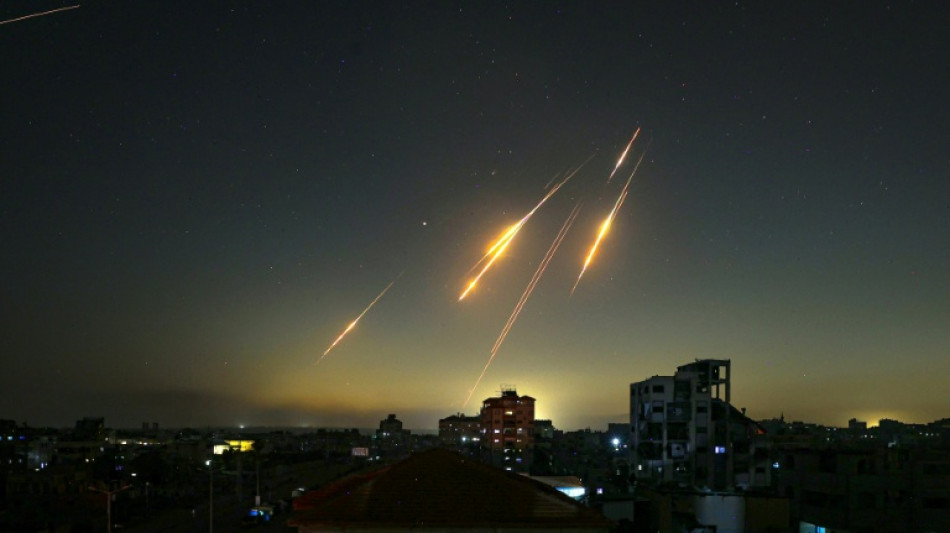
Israel warns 'Tehran will burn' after wave of missile fire

Israel's defence minister warned Saturday that "Tehran will burn" and its residents pay dearly if Iran continues its missile strikes against Israeli civilians.
"The Iranian dictator is turning the citizens of Iran into hostages and bringing about a reality in which they –- especially the residents of Tehran -– will pay a heavy price because of the criminal harm to Israeli civilians," said Israel Katz.
"If (Iran's supreme leader Ayatollah Ali) Khamenei continues to fire missiles toward the Israeli home front –- Tehran will burn," the minister added.
The threat came as Israel and Iran exchanged fire a day after Israel unleashed strikes that Iran said hit its nuclear facilities, "martyred" top commanders and killed dozens of civilians.
Iran has hit back with waves of drone and missile strikes, with a barrage of dozens lighting up the skies over Jerusalem and Tel Aviv overnight, killing three people and wounding dozens.
Following decades of enmity and conflict by proxy, it is the first time that Israel and Iran have traded fire with such intensity, with fears of a prolonged conflict engulfing the region.
The operation -- dubbed "Rising Lion" -- has since killed Iran's highest-ranking military officer, Mohammad Bagheri, and the head of the Revolutionary Guards, Hossein Salami, among other senior generals.
On Saturday, the Israeli military said it had Tehran in its sights after strikes on dozens of missile launchers and air defences in the area around the Iranian capital.
"The way to Iran has been paved," the military's chief of staff and air force chief were quoted as saying in a statement.
The military "is proceeding according to its operational plans, and (Israeli air force) fighters jets are set to resume striking targets in Tehran," it added.
- 'Smoke, dust' -
Iran's ambassador to the United Nations said 78 people had been killed and 320 wounded in Israel's first wave of strikes on Friday.
Iran called on its citizens to unite in defence of the country as Israeli Prime Minister Benjamin Netanyahu urged them to rise up against their government.
Air raid sirens and explosions rang out across Israel through the night, with many residents holed up in bomb shelters until home defence commanders stood down alerts.
Israel said dozens of missiles -- some intercepted -- had been fired in the latest salvos from Iran, with AFP images of the city of Ramat Gan near Tel Aviv showing blown-out buildings, destroyed vehicles and streets strewn with debris.
Israeli rescuers said two people were killed and 19 wounded on Saturday by rocket fire on a residential area in the coastal plain.
Iran's Revolutionary Guards said they had attacked dozens of targets in Israel.
Israeli firefighters had worked for hours to free people trapped in a high-rise building in Tel Aviv on Friday.
Chen Gabizon, a resident, said he ran to an underground shelter after receiving an alert.
"After a few minutes, we just heard a very big explosion, everything was shaking, smoke, dust, everything was all over the place," he said.
Rescuers said 34 people were wounded in the Gush Dan area, including a woman who later died of her injuries, according to Israeli media reports.
Speaking to CNN, Israel's ambassador to the United States, Yechiel Leiter, said Iran had fired three salvos of ballistic missiles on Friday, some 150 in total.
"We expect that the Iranians, who have a considerable volume of ballistic missiles, somewhere in the neighbourhood of 2,000, will continue to fire them," Leiter said.
In Tehran, fire and heavy smoke billowed over Mehrabad airport on Saturday, an AFP journalist said, as Iranian media reported an explosion.
Blasts were heard across the capital as Iran activated its air defences against the incoming fire.
Dozens of Iranians took to the streets to cheer their country's military response, with some waving national flags and chanting anti-Israel slogans.
- 'Time to stop' -
The attacks prompted several countries in the region to temporarily ground air traffic, though on Saturday morning, Jordan, Lebanon and Syria reopened their airspace.
Iran's airspace was closed until further notice, state media reported.
As fears mounted of wider conflict, UN chief Antonio Guterres called on both sides to cease fire.
"Enough escalation. Time to stop. Peace and diplomacy must prevail," he said on X late Friday.
Pope Leo XIV appealed for Israel and Iran to show "responsibility and reason".
Asked how long the war would last, Israel's ambassador to Paris, Joshua Zarka, said: "A small number of weeks". Prime Minister Netanyahu had said on Friday the strikes would "continue as many days as it takes".
The conflict has thrown into doubt Sunday's planned Iran-US nuclear talks in the Gulf sultanate of Oman.
After Friday's first strikes, US President Donald Trump urged Iran to "make a deal", adding the United States was "hoping to get back to the negotiating table".
Western governments have repeatedly accused Iran of seeking a nuclear weapon, an allegation it denies.
Iran said on Saturday its participation in the Oman talks remained "unclear".
"It is still unclear what decision we will make for Sunday," state media reported, citing foreign ministry spokesman Esmaeil Baqaei.
Baqaei had called the talks "meaningless" in view of the Israeli strikes, which he alleged were carried out with "US permission".
A.Rastelli--INP

 London
London

 Manchester
Manchester
 Glasgow
Glasgow
 Dublin
Dublin
 Belfast
Belfast
 Washington
Washington
 Denver
Denver
 Atlanta
Atlanta
 Dallas
Dallas
 Houston Texas
Houston Texas
 New Orleans
New Orleans
 El Paso
El Paso
 Phoenix
Phoenix
 Los Angeles
Los Angeles



